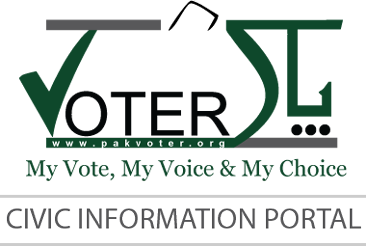Citizens’ groups, civil society, the media and other stakeholders keep an eye on the transparency, impartiality and fairness of the electoral process Through ‘election observation’. This helps identify gaps in the system and possible solutions for them. The reports of election observation by various civil society organizations and international observers are shown below.
There is a gender gap1 of around 12.5 million in Pakistan’s electoral rolls. According to the Election Commission of Pakistan’s (ECP) report on the final electoral rolls for 2018, women comprise 44.1% of approximately 105 million citizens registered as voters.2 This restricts a significant percentage of Pakistani women from exercising their right to choose their political representatives and participate in electoral processes. […]
Elections are not be-all and end-all of the democratic process. In fact, elections are significant component but equally significant is the intervening period between the elections. Citizens can only benefit from the fruits of democracy if they stay vigilant during all phases of democratic process.
Pakistan held General Elections on 11 May 2013, the largest electoral process to date involving over 86 million voters and nearly 650,000 polling personnel working at nearly 70,000 polling stations. The Election Commission of Pakistan (ECP) strove throughout the process to deliver a free, fair and transparent election and to support the democratic progress of the country. Many observers applauded the elections as the most credible in the history of Pakistan
The report is offered by the joint international election observation mission of the National Democractic Institute (NDI) and the Asian Network for Free Elections (ANFREL). The Mission consisted of 48 observers from 18 countries. NDI-ANFREL observers arrived in Pakistan on April 26 and stayed in country through May 22. On election day, observers were deployed to 12 locations in Islamabd and three of the nation’s four provinces, visiting more than 250 polling locations. Security concerns prevented direct observation in Baluchistan and the Federally Administered Tribal Areas (FATA). However, the mission was in frequent contact with candidates, parties and nongovernmental organizations in those areas to follow election-related developments that were not directly accessible to the delegation.
As part of FAFFEN’s comprehensive election observation strategy, a long term observation of critical processes and implementation of laws, rules and regulations was conducted between Febraury and May 11, 2013, the day elections were held
A strong democratic commitment was demonstrated in the 2013 elections, by the state authorities of Pakistan, Civil Society, Political Parties and voters. Despite escalating militant attacks, and procedural shortcomings, the electoral process, progressed with high levels of competition, a marked increase in voter participation and overall participation , and overall acceptance of the outcome. The electoral reform undertaken in the last few years, particularly in regards to the leadership of the Election Commission of Pakistan (ECP) and the electoral roll, provided for a significantly improved processes. However fundamental problems remain with the legal framework and the implementation of certain provision, leaving future processes vulnerable to malpractice and Pakistan not fully meeting its obligations to provide citizens the right and opportunity to stand as candidates and to vote
The researchers (TR) is a social governance research organization that has customized election observation of women contested constituencies from pre-poll to post-poll phase under its regional initiative “Women in Politics in Asia Forum”. Domestic observation is a critical factor to enhance the credibility of a country’s election.
There is a need for active participation of women in the struggle for the protection of human rights and enduring democracy, GCI maintains its stand that women should be given a chance to actively participate in decision-making at all levels of political positions for there to be enduring democracy
From June 13 to July 18, 2007, FAFFEN conducted Pakistan’s first statistically valid audit of the draft electoral roll (2007) FAFFEN conducted a List-to-People and People-to-List audit in. electoral areas covered by 506 randomly
FAFFEN offers two new publications on the one year anniversary of the February, 18 2008. Pakistan General Elections, the first publication – Election Day process Analysis – Presents data and analysis not previously available based on qualitative observation checklists from more than 18,000 FAFFEN election day observers.
In its meeting of 17 January 2008 the Conference of Presidents authorised the sending of a seven-member delegation to observe the elections to the National Assembly and Regional Assemblies of Pakistan on 18 February 2008, subject to the condition that the Pakistani authorities gave Parliament assurances in writing concering the security of the members of the delegation
On February 18, 2008, Pakistan held critically important elections for its National Assembly and its four provincial assemblies. These elections were a major test of the country’s prospects for democracy and political stability, offering Pakistan an important opportunity to establish a new basis for democratization. The elections occurred within a context of widespread uncertainty, controversy and political turmoil. including significant pre-election violence.














